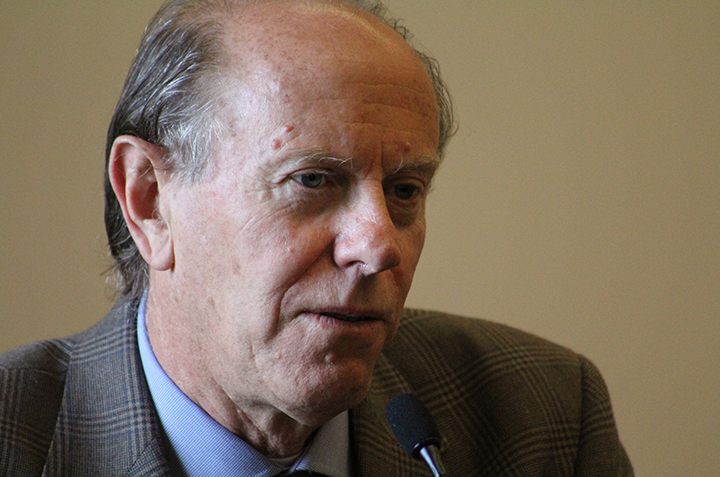
Former opposition Member of Parliament cites ‘serious political vacuum’ in the country
Zimbabwe is in “grave danger” of political violence and its fractured opposition is “poisoned” because of an undemocratic culture, according to David Coltart, a founding member of the country’s main opposition party, the Movement for Democratic Change (MDC).
“There is a very serious political vacuum in the country,” said Coltart, a former Education Minister, Senator, and Member of Parliament in Zimbabwe. He spoke at an event hosted by the Atlantic Council’s Africa Center on Capitol Hill on April 26.
Zimbabwe has been led by President Robert Mugabe since 1987.
“Although he is amazingly energetic for ninety-two, he is immensely out of touch,” Coltart said of Mugabe, noting the threat of political infighting in the President’s ruling Zimbabwe African National Union-Patriotic Front (ZANU-PF) party and recent fissures in the security forces.
The MDC—of which Coltart was a member while in politics—is likewise divided and personality-driven. “The country is rudderless,” Coltart said.
Compounding fractious politics is what Coltart called Zimbabwe’s tendency to cave to the cult of personality, a familiar predicament for Americans as election season is in full swing. As Coltart noted, “Policy and principle is lost to personality.”
Rep. Ed Royce (R-CA), Chairman of the House Committee on Foreign Affairs, in his opening remarks recalled Zimbabwe’s unravelling in the late 2000s—both economically and on the human rights front. But he warned against becoming desensitized to the country’s current situation.
Coltart knows the human cost of turmoil in Zimbabwe all too well. As a young lawyer returning to Zimbabwe from his studies in South Africa in the 1980s, Coltart began work on one of Zimbabwe’s darkest periods—the infamous Gukurahundi massacres. He worked as a human rights activist, joined the opposition MDC, and in 2000, entered politics. Death threats and attempts on his life followed.
Over nearly five decades, Coltart chronicled his life’s work in Zimbabwe, featured in his newly released book, The Struggle Continues: 50 Years of Tyranny in Zimbabwe.
“What Zimbabwe desperately needs is a truth-telling,” Coltart said, noting that propaganda used by both sides of the political spectrum has been detrimental to the country and its people.
For the United States, Coltart agreed that Zimbabwe does not present the same security threat as does, for example, Libya, or the Horn of Africa. But he called Zimbabwe the “key to southern Africa,” conceivably the continent’s most democratic region and an important geographic, commercial, and transport hub.
“Zimbabwe can have either a powerful effect on southern Africa, or it can be a cancer,” he said. And if Zimbabwe fails, “Fragile transitions to democracy in other regions could be undermined.”
The key to engagement with Zimbabwe must be multifaceted, Coltart suggested, and encompass reform of the judicial, legislative, and executive branches.
“Democracy is a process. It’s not an event,” he said.
Coltart stressed that implementation of the country’s constitution—which he said offered real opportunity for meaningful reform—is paramount to any international approach to the country. He suggested that US sanctions against the country are past their “sell-by” date, and that the restrictions only benefit the political elite, who blame their own economic failures on the sanctions.
And so, Coltart said, “The struggle continues.”
Kelsey Lilley is an Associate Director at the Atlantic Council’s Africa Center.
Image: “There is a very serious political vacuum” in Zimbabwe, David Coltart, a former Education Minister, Senator, and Member of Parliament in Zimbabwe, said at an event hosted by the Atlantic Council’s Africa Center on Capitol Hill on April 26. (Atlantic Council/Julian Wyss)
